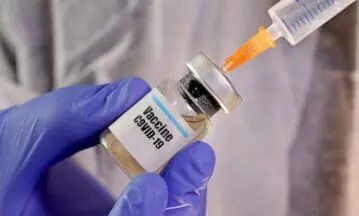
Race to vaccinate against Covid-19 accelerates
text_fieldsFor representational purpose only
The race to vaccinate the entire population of the world against Covid-19 has intensified recently with many vaccine candidates in the last stage waiting for authorisation and approval. A small number of vaccine doses have started to become available from Western pharmaceutical companies and the governments are already competing to get hold of those.
This could lead to a disparity in the speed of inoculation in different countries. The US has pre-purchased 500 million doses and Europe 400 million doses of the vaccine AstraZeneca. With all the rich countries already striking contracts with drug makers and pre-ordering vaccines, the poor countries do not stand a chance and might have to wait for months or even years to vaccinate their population.
UK has approved its vaccine thereby becoming the first western nation to authorize one. Vaccines like those of Pfizer, Moderna, AstraZeneca, Sputnik etc that use novel RNA technology are some of the vaccines awaiting approval.
RNA vaccines are hard to scale up as they struggle to secure enough raw materials and technology needed for the challenging manufacturing process. Since both Moderna and Pfizer also require two doses, they will not be able to meet the production target they declared by the end of this year.
China's three leading vaccines have already received orders from many countries but it is on hold as these vaccines are yet to clear the efficacy test. Mexico, India and Egypt are counting on the Russian vaccine but Russia itself is struggling to produce enough doses for its own people. Africa is yet to figure out which vaccine candidate would be available for them and the feasibility of delivery.
The poor countries are depending on the Geneva-based public health institution (GAVI) which is raising money to vaccinate those in about 92 developing countries. However, the speed of inoculating the population depends upon whether the traditional or RNA vaccines prove to be more safe and effective. Even if any vaccine proves to be effective at all, it is most likely to be in limited supply in the near future.






















